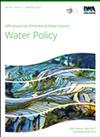Water policy reform in the Nigeria water governance system: assessment of water resources management based on OECD Principles on Water Governance
IF 1.8
4区 环境科学与生态学
Q4 WATER RESOURCES
引用次数: 2
Abstract
Conflicts of interest due to cultural, political, and social oversights have threatened effective and efficient corporate water governance in Nigeria. This has affected the inclusive participation of stakeholders, policy makers and the relevant agencies of the water resources management, thus hampering good water governance. Assessing the water governance impacts based on frameworks proposed for effective, efficient and inclusive governance was aimed. Information contributing to the governance input was highlighted by analyzing hydrological units that characterized Nigerian watersheds. Toxicological index (Ti) values were presented as a practical guideline to assessing water policy outcomes. The (Ti) ≥ 1.0 dominated; signifying the water resources exposed to toxic environments. High pollutant loads associated with public health deterioration across Nigeria are considered as impacts indicating lagged water governance. While the lagged governance output manifested in some diseases relating to deficient access to potable water supply/poor sanitation services like Blue baby syndrome, Renal/liver/lung diseases and blood cancer, the outcome showed an absence of health and social wellbeing. These indicators demonstrate the need for incorporating Organization for Economic Co-operation and Development (OECD) Principles on Water Governance in the Nigerian water governance system. Notably, flexibility across all governance levels can enable shared responsibility to balance economic activities with the ecological wellbeing.尼日利亚水治理系统的水政策改革:基于经合组织水治理原则的水资源管理评估
由于文化、政治和社会疏忽造成的利益冲突威胁到尼日利亚有效和高效的企业水治理。这影响了利益攸关方、决策者和水资源管理相关机构的包容性参与,从而阻碍了良好的水治理。旨在根据为有效、高效和包容性治理提出的框架评估水治理的影响。通过分析尼日利亚流域的水文单位,强调了有助于治理投入的信息。毒理学指标(Ti)值作为评估水政策结果的实用指南。以(Ti)≥1.0为主;表示暴露在有毒环境中的水资源。与尼日利亚各地公共卫生恶化相关的高污染物负荷被认为是表明水治理滞后的影响。虽然治理产出滞后表现在一些与缺乏饮用水供应/卫生服务差有关的疾病上,如蓝婴儿综合征、肾脏/肝脏/肺部疾病和血液癌症,但结果显示缺乏健康和社会福利。这些指标表明,有必要将经济合作与发展组织(经合组织)的水治理原则纳入尼日利亚的水治理体系。值得注意的是,各级治理的灵活性可以使共同的责任能够平衡经济活动和生态福祉。
本文章由计算机程序翻译,如有差异,请以英文原文为准。
求助全文
约1分钟内获得全文
求助全文
来源期刊

Water Policy
环境科学-水资源
CiteScore
3.10
自引率
12.50%
发文量
81
审稿时长
6-12 weeks
期刊介绍:
Water Policy will publish reviews, research papers and progress reports in, among others, the following areas: financial, diplomatic, organizational, legal, administrative and research; organized by country, region or river basin. Water Policy also publishes reviews of books and grey literature.
 求助内容:
求助内容: 应助结果提醒方式:
应助结果提醒方式:


